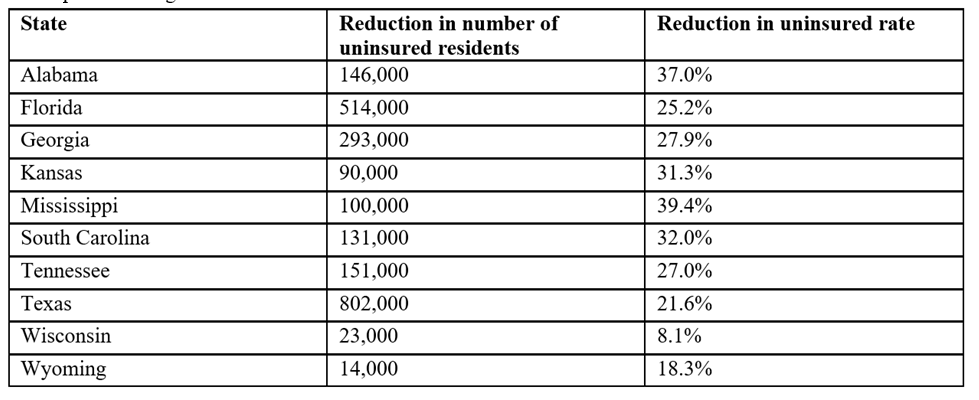2.3M would gain health coverage if 10 states expanded Medicaid
The uninsured population in 10 states would drop by 25%—or 2.3 million people—if they fully implemented Medicaid expansion, according to a new analysis from the Urban Institute, with support from the Robert Wood Johnson Foundation.
Under the Affordable Care Act, states have the option to expand Medicaid eligibility to nonelderly adults with incomes up to 138% of the federal poverty level. Ten states—Alabama, Florida, Georgia, Kansas, Mississippi, South Carolina, Tennessee, Texas, Wisconsin, and Wyoming—have not yet expanded Medicaid eligibility.
State-specific data goes as follows:
According to the analysis, critical findings include:
- Women of reproductive age would see a large reduction in uninsurance (a drop of 31%), compared to older women (drop of 23.2%) and men (drop of 22.4%).
- Non-Hispanic Black women of reproductive age would see a 51.3% reduction in uninsurance.
- Non-Hispanic Black adults would see the largest reduction in the uninsured rate of any racial or ethnic group (43.2% reduction).
- Young adults ages 19 to 24, the age group with the highest uninsured rate, with nearly one in five individuals uninsured (19.9%) would see the greatest decrease in the rate of uninsurance (a drop of 32.4%).
Numbers show that states which previously expanded Medicaid found new spending on expansion is outweighed by long-term savings in healthcare expenditures and new revenue. As such:
- State spending on Medicaid in the remaining 10 states would increase by $1.5 billion (an increase of 3%). There would also be a variety of additional state savings and new revenue under expansion that researchers did not estimate.
- Federal spending on Medicaid in these states would increase by about $24 billion (an increase of 17.5%).
The report shows that this spending would be offset, however, by federal, state, and local government savings on uncompensated care, which also improves hospital finances.
“The coverage gap is perhaps the cruelest loophole in our fragmented coverage system. Expanding Medicaid eligibility in the remaining states would increase health equity, and generate health, social, economic, and fiscal benefits throughout the state,” said Katherine Hempstead, senior policy adviser at the Robert Wood Johnson Foundation. “We know from studies of other states that expanding Medicaid improves health outcomes for those who gain coverage, disproportionately populations of color, and additionally supports healthcare providers, especially in rural areas, and creates jobs.”
“Our analysis shows expanding Medicaid eligibility or implementing Medicaid-like coverage under the president’s budget proposal in the remaining 10 nonexpansion states would significantly reduce the number of uninsured,” said Matthew Buettgens, senior fellow at the Urban Institute. “Expanding Medicaid eligibility would provide substantial health and economic benefits at little or no cost to state governments.”
Read the brief: "2.3 Million People Would Gain Health Coverage in 2024 if 10 States Were to Expand Medicaid Eligibility."





Brightway Insurance Ranks Third on Yahoo! List of Top 20 Affordable Franchises with High Profits
Acuity Earns Top Claims Award at Excellence in Insurance, Sponsored by Insurity
Advisor News
- Social cultivation: How to talk with wealthy prospects
- How important is a written financial plan?
- Coalition wants to advise people impacted by policy changes in new administration
- Diagnosing miscommunication in retirement planning
- Election creates an opportunity for advisor/client dialogue
More Advisor NewsAnnuity News
Life Insurance News
Property and Casualty News
- Home insurance reform urgently needed in California, watchdog says
- Insurance reform urgently needed, watchdog says
- State-run property insurance provider Citizen defends high rate of claims closed without payment; "We don't want your business”
- AM Best Affirms Credit Ratings of NongHyup Property and Casualty Insurance Company Limited
- Springfield Township Committee Introduces Ordinance for Business Insurance Registry Requirement
More Property and Casualty News